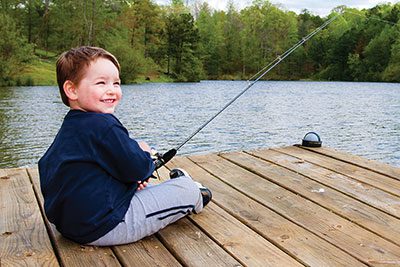
The Summer months are now here along with the advent of the summer school vacation time period. For many children, they have time on their hands and are looking for activities to keep themselves busy. Fishing could be a good activity for them to engage during the summer months. Many families also schedule their family vacations during these months. Incorporating fishing into family vacation outings can encourage a child’s interest in angling.
When taking a child or young person fishing, they are not going to approach the same as an adult. Their attention span is much shorter, and children will likely require fish action to maintain their interest.
Consider the following points when taking young people fishing:
- Use fishing equipment appropriate for the child’s skill level and size. They may require starting out with spincast reels and shorter rods, then later graduating to open face spinning reels.
- Target fish that are easy to catch in order to maintain the child’s interest. Seek a mixed bag of fish species to include panfish, catfish, and bass if fishing warm waters.
- Look for hatchery supported trout waters if fishing in cold water settings. These hatchery supported fish may be easier to catch than wild trout.
- Shorten the fishing day; do not expect to spend the entire day from sun-up to sundown fishing with a child. Short time periods are in order to maintain interest. Take frequent breaks from fishing, maybe interspersing fishing with another outdoor activity.
- Be prepared with drinks and snacks for use over the course of the fishing day.
- Be prepared to take frequent bathroom breaks.
- Plan to go fishing only when the weather is good. Children will most likely not enjoy being outdoors when it is overly hot, cold, or raining.
- Plan to use a variety of baits to include both artificial and live baits. Be prepared to tie knots, rig tackle, and bait hooks. You may also be required to make some casts for the child if they are unfamiliar with the equipment.
- Do not expect the young person to cast perfectly. Prepare for line tangles and hooking up on shoreline and underwater obstructions. Try to pick open fishing locations that do not have a lot of trees, rocks, or weeds to minimize tangles.
- Expose young people to conservation and protecting the fishing locale. Do not litter and discard used fishing line, bait holders, drink and snack containers in trash .receptacles or take it back home with you to be discarded properly. Take a small trash bag with you to collect your trash as well as some that may have been left behind by others. Make it a better place than you found it. Show and tell children about the other wildlife that they may see while fishing.
- Be patient and flexible; the fishing experience is supposed to be fun. The child if inexperienced with fishing is going to make mistakes.
- If you catch a fish, consider handing off the rod and reel to the youngster allowing him or her to fight and land the fish.
- If going on multiple trips with a child, visit different waters and target a variety of fish species. The child may develop an interest in a particular body of water.
- Be safe. Watch the child carefully and use life preservers if necessary.
Exposing young people to fishing can become a lifelong interest. The future of angling and the waters that we fish today will require future generations to show an interest and protect them. You may find that you have a new fishing partner.
Dr. Andrew Cox is a contributing writer to outdoor publications and newspapers. He is a member of the Georgia Outdoor Writer’s Association. He has been fishing the waters of Georgia, Alabama, and north Florida for over forty years.